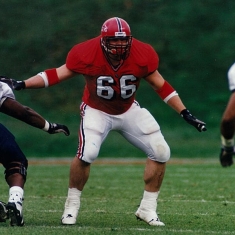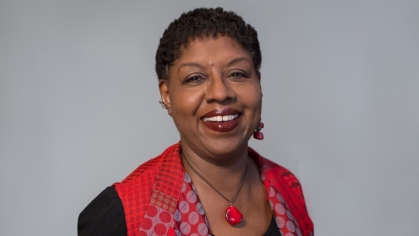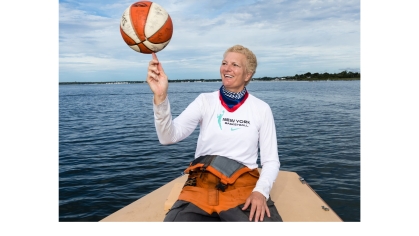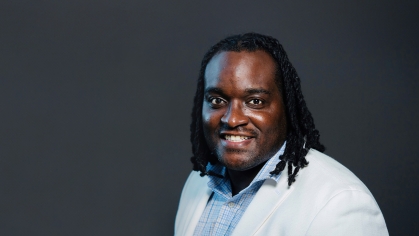What I Know Now: Rutgers Football Alumnus Shaun O’Hara

From Scarlet Knights walk-on to Super Bowl champion to NFL analyst, Shaun O’Hara has made football his life while championing causes like funding a cure for cystic fibrosis and endowing a scholarship.
When Shaun O’Hara’s Sunday school teacher asked his class what they wanted to be when they grew up, the usual answers came up: firefighter, doctor, teacher. Five-year-old O’Hara answered, “I was born to play football. I want to be a football player.”
He liked running around in his father’s college football helmet, tackling his brother, outrunning neighborhood kids. After nagging his parents, they let him join a team in fifth grade.

Next, having played for Hillsborough High School in central New Jersey, he wanted to play “big-time college football,” but recruiters told O’Hara that at 6 feet, 3 inches tall and 225 pounds, he wasn’t big enough to be a Division 1 lineman. Undaunted, he enrolled at Rutgers as a redshirt walk-on. He set his sights on a football scholarship, which meant getting much bigger. Through dogged determination and weight training, he put on 35 pounds and excelled for the Scarlet Knights.
He moved on from Rutgers to the NFL in 1999, playing four seasons with the Cleveland Browns before joining the New York Giants. In 2008, he achieved the ultimate football dream when he played center for the Giants team that quarterback Eli Manning led to a Super Bowl championship.
Today, as an analyst for the NFL Network and the Giants, he raises funds through the Shaun O’Hara Foundation to help families affected by cystic fibrosis. The 2014 inductee to the Rutgers Athletics Hall of Fame also has endowed a scholarship for Rutgers football walk-ons.
Here is O’Hara’s story, which includes the importance of setting goals, a philosophy he learned at his father’s knee, as well as his thoughts about what it means for Rutgers to play in the Bad Boy Mowers Pinstripe Bowl at Yankee Stadium on December 28.
No Fear
In fifth grade, I finally get to play football. My dad tells me to get my pads on and meet him in the backyard. He says, “You have to learn how to hit, how to get hit. Get down on a three-point stance and fire out at me. Try to block me.”
I say, “Dad, you don’t have on pads.” He says, “I’ll be fine, just fire out at me.” So I did. He gave me the hardest forearm to my chest I’ve ever gotten. I went flying, landed on the ground, staring up at the sky, asking what just happened. He comes over and asks if that hurt. I say, not really. He says, “Good. Now you don't ever have to be afraid. Nobody will hit you harder than that.”
His thing was when you go on a football field, you can’t be afraid. That stuck with me. I wasn’t the biggest kid. I wasn’t fastest, tallest, heaviest—but I had no fear. I was never going to be hurt or get hurt.
Goal Posts for Life
My dad was adamant about setting goals—not just setting them but telling somebody about them. If you have goals and keep them to yourself, nobody can hold you accountable. You have to share that goal with somebody so they can remind you what you wanted to do.
Going into sophomore year in high school, I wasn’t starting. Dad said, “Go tell your coach you want to play. He may not know.” And I said, “Why wouldn’t he know? Everybody wants to play.” He says, “Go tell him.”
After practice—I was so nervous—I said, “Coach, I want to let you know I want to play. I’m ready to play whatever position you want.” He said, “OK, thanks for telling me.” Next thing I know, someone gets hurt, he looks over the sideline, I’m the first one in.
Set a goal and achieve it through hard work. That became my calling card for the rest of my career. Even after I got the scholarship, Dad says, “So you checked that box. What's your next goal?” Can’t I be happy? I’m still reveling in this accomplishment. He’s like, “No, let’s set another goal.”
Walk-On Magic
A lot of walk-ons came after me. I felt a kinship with them. I knew how tough it was and wanted to give back. But do you just write a check and then not know where it goes? I wanted to do something with an absolute impact and know who it was directly benefiting.
Rutgers had an unbelievably low number of endowed scholarships, and I said, “Boom, that’s what I'm going to do. I’m going to endow a scholarship for a walk-on that lives on in perpetuity and becomes self-sustaining.”
There’s a little joke that if you have a walk-on from Rutgers on your team, chances are you’re probably going to win a Super Bowl. We were the good luck charm. The Colts won it in 2007 with Gary Brackett, and then we (Giants) won it in 2008. Then Darnell Stapleton won it in 2009 with the Steelers. We had a pretty good run there for the Scarlet Knights. Rutgers guys who played in the NFL were successful because they had to work for it.
Jersey Boys and Bowl Fever
The thing that differentiates Rutgers football players from other universities is we are tough. We have Jersey roots. You’re either from Jersey, or you came to Rutgers and fell in love with Jersey. There’s a mental as well as a physical toughness.
Losing builds character as well as reveals it. I coach my son’s team now, and I tell them, W stands for a win, and L stands for learn. It’s learning. It’s the way things were at Rutgers too. You learned a lot about yourself, about the team, about football. The other L is finding out who loves football. Everybody loves football when you're winning. When you’re losing, that’s when you know who really loves the game.
Everybody gets excited about being bowl eligible. I never got to experience a bowl game in college, so I love that these kids get to experience that. They will have that to share as a team. That’s the goal all year long. You’ll remember that trip for the rest of your life.
It makes you a better football player. Our seasons would be over at Thanksgiving. If you play in a bowl game, you have another month to play and practice, to spend time as a team.
Fighting Until C.F. Means “Cure Found”
My parents instilled in me that being in the NFL is a privilege, one of the highest honors you can achieve in football. But what you do when you get there and the platform you have is just as valuable. I felt a responsibility to give back and I’ve always had a soft spot in my heart for kids.
In 2007, Bill Squires (a football facilities consultant) would bring his son Sean to Saturday practices. I couldn’t tell but Bill said Sean had cystic fibrosis and asked if I would be interested in being the Cystic Fibrosis Foundation’s Ambassador of Hope for New Jersey. The fact that we had the same name was an immediate bond.
I didn’t realize how devastating it was for these kids and their families. How painful it is for moms and dads to see their child have to take 65 pills before breakfast and everything they go through. These kids are warriors. They’re doing more than most kids before they even get on the school bus. One of the coolest things in the CF community is we have a saying that we won’t stop until CF stands for “cure found.”
Learn more about Rutgers football’s appearance in the Bad Boy Mowers Pinstripe Bowl in Yankee Stadium on December 28.
Support Football
Please consider a gift to support the Rutgers Scarlet Knights football program.


